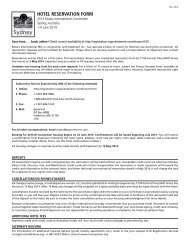DISCURSOS - Rotary International
DISCURSOS - Rotary International
DISCURSOS - Rotary International
You also want an ePaper? Increase the reach of your titles
YUMPU automatically turns print PDFs into web optimized ePapers that Google loves.
At RI, we recognize that continuity in our strategic priorities ultimately leads to more effective<br />
service. And we recognize that applying this thinking not only to how we run our organization<br />
but how we serve our communities results in more effective service as well. That is why I would<br />
urge each of you to utilize <strong>Rotary</strong> Club Central, a new tool that RI rolled out this past summer,<br />
which is designed to help districts and clubs, on the one hand, to better understand and capture<br />
their past goals and achievements, and to plan strategically for several years into the future. It is<br />
a great tool and it has received extremely positive feedback from those district leaders who have<br />
used it so far. It’s on the rotary.org website under Member Access, and I encourage each of you<br />
to take a look, spend some time learning about it, . . . and then start using it, when you get back<br />
home.<br />
Setting ambitious but realistic goals, and tracking our progress toward meeting them, is essential<br />
to keeping clubs and districts on track in their <strong>Rotary</strong> service.<br />
The goal isn’t just doing good work — it’s doing the best work we can, work that will have the<br />
largest, and longest-lasting, positive impact.<br />
And this brings me to the second concept I’d like to talk about today, which is sustainability.<br />
Whereas continuity is a familiar word in <strong>Rotary</strong>, sustainability is something that we’ve started<br />
talking about only more recently. But it’s a word you’re going to hear a lot this week, and it’s a<br />
word that is going to be absolutely central as we move into a new chapter of our <strong>Rotary</strong> Foundation,<br />
with Future Vision.<br />
Sustainability, at its core, means that the work you do will have a continued impact, without<br />
continued investment. The classic example is giving a man a fish, versus teaching him to fish. A<br />
helping hand that meets a need in the short term is never as efficient a use of our resources as<br />
an investment that will continue to meet that need over time. For example, we might look at a<br />
village without a source of clean water — a situation that you see so often in so many parts of<br />
the world. It’s tempting to look at this situation and say, you know, for a few thousand dollars, we<br />
could go in there and dig a well and put in a pump, and the villagers will have water.<br />
And in fact, that’s what many people do, and have done, both in <strong>Rotary</strong> and in other organizations.<br />
And that is why many parts of the world are littered with broken pumps — pumps built<br />
by well-meaning people who did not think past that first gush of clean water, who perhaps did<br />
not plan for what would happen when a pump breaks, or needs a new part, or just needs to be<br />
cleaned and maintained to keep the water drinkable.<br />
So that’s why we’re talking about sustainability, and why sustainability is going to be so key to<br />
the success of Future Vision. Because when your mindset is on sustainable projects, you realize<br />
that fixing the problem of that village without water is going to take a little more effort, a little<br />
more involvement. If you really want to fix the problem, and do it right, it might not be the work<br />
of a few weeks and a few thousand dollars.<br />
If you’re committed to doing it right, you’ll involve the community. You’ll work with local stakeholders<br />
to determine exactly what’s needed and what the challenges are. You’ll make sure mechanisms<br />
are in place to provide a reserve fund for maintenance, and that there are people — not<br />
just one person, but multiple people — who are responsible for that pump, who know how to fix<br />
it, who can get spare parts and install them, who are invested in seeing to it that the pump keeps<br />
working, not just for a few days or months, but for many years, and that when the pump needs<br />
to be replaced, it will be.<br />
Because clean water that lasts for only a few months isn’t going to change anyone’s life. But<br />
clean water that is reliably available means families who are healthier, children who go to school,<br />
mothers whose days are not consumed by meeting their families’ most basic needs. And all of<br />
this good impact will continue on — after the last hand is shaken, the last bag is packed, and the<br />
last <strong>Rotary</strong> dollar is spent on that particular project.<br />
28 <strong>International</strong> Assembly Speeches 2013


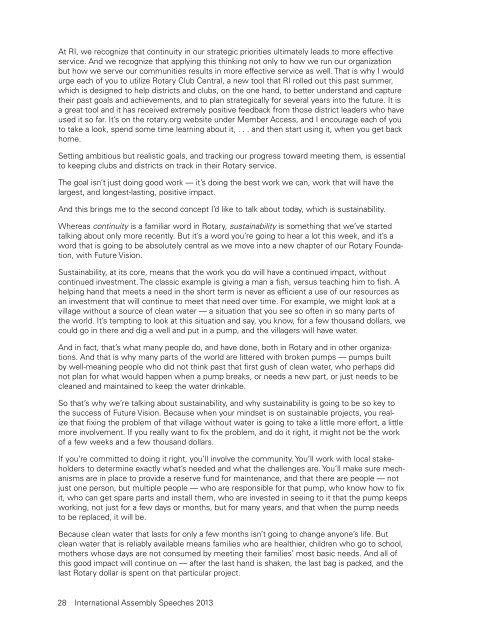
![La présidence du club [222-FR] - Rotary International](https://img.yumpu.com/25855726/1/190x245/la-presidence-du-club-222-fr-rotary-international.jpg?quality=85)

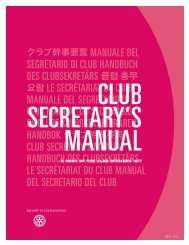

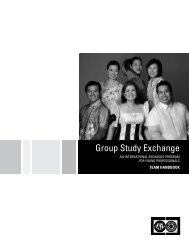
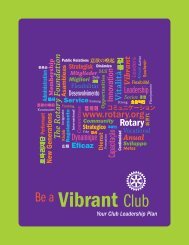

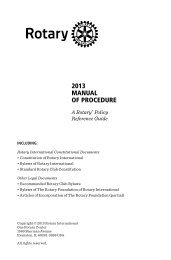


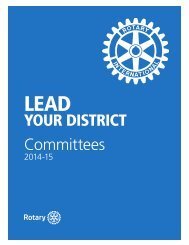
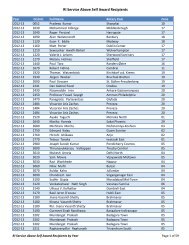
![La conférence de district [800-FR] - Rotary International](https://img.yumpu.com/25855636/1/190x245/la-conference-de-district-800-fr-rotary-international.jpg?quality=85)
